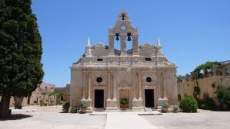
Something you probably didn’t know about the Second World War is that Crete, Greece was the place most brutally repressed by the Nazis. This means that there were proportionally more reprisals (basically revenge attacks by the Nazis on the local population for any acts of resistance, real or not) than anywhere else in the war. The Cretan people showed a remarkable courage and persistence during the 4 years occupation, but unlike the French Resistance, they don’t get nearly enough credit for what they did. Their actions helped Allied forces to free the island in 1945, and the mass involvement in the resistance proved to be a force to be reckoned with.
So who were these people that got involved to save their homeland? It was a hugely diverse group. Young men, old men, grandmothers, priests, mothers and even children formed the Cretan resistance. You also had many Greek army soldiers who stayed behind to help their fellow Greeks, even after the Germans successfully captured the island. Lastly, some British military men helped, although the evacuations of the Commonwealth soldiers began before the battle finished. One of the more organised parts of the Cretan Resistance was an Allied unit called “Special Operations Executive”.
What did the “Special Operations Executive” do? Well, they specialised in guerrilla tactics and espionage (spying). Their main activities included helping communications between members of the Cretan resistance, by allowing Greeks to use their radio equipment. They also organised different parts of the Resistance to mould them into a coherent shape. On the more extreme end of the scale, they actually kidnapped an important Nazi stationed on Crete - General Kreipe. The story of this infamous attack is depicted in the book (and film), Ill Met By Moonlight. Author William Stanley Moss described the plan, kidnapping and the Cretan Resistance fighters they encountered along the way. Himself and colleague Patrick Leigh Fermor became some of the most famous faces of the Cretan occupation, and their stories are still widely used by historians today.
The kind of resistance that occurred was unique. Obviously, there was guerrilla fighting in the towns, streets, and even in the rural mountains. There was also a lot of passive resistance, for instance ordinary civilians denying any knowledge of the resistance. Such passive resistance meant a lot of non-cooperation, but the price to pay was a heavy one. The Nazis killed thousands of Cretans on no grounds whatsoever, because they did not see them as real people. Even the slightest thing out of the ordinary would be grounds for execution. So, people had to be very careful not to get caught, and indeed many were afraid to get involved at all. One type of resistance that families often did was harbouring members of the resistance, and giving them a place to stay for a night or two. Though they were poor, many families did all they could to help those fighting for the freedom of their island.
However, there were a few factions (divisions) within the Resistance itself. The difference was between Royalists, Venizelists (see my article about Eleftherios Venizelos for more) and Communists. Did you learn about the Marshall Plan in history? When it said it would give money to any states trying to resist Communism, Greece was essentially the main target. The divisions were based upon who would gain power after the Nazis were finally defeated, and these divides really did not help to free Crete from its oppressors.
Though this part of history is largely forgotten by most of us, the Cretans remember it well. Most villages will commemorate those they lost during the war, and there will often be statues or memorials to remember the dead. Larger towns have memorials marking the sites of important battles, and the names of the Allied soldiers who tried to help the Greeks. It’s important that we don’t forget the horrors of this particular occupation, as they so deeply affect those who live on the island we see as a popular holiday destination.
Image from: http://arkadi-cretan-dance.gr/rethymno/

0 Comment:
Be the first one to comment on this article.